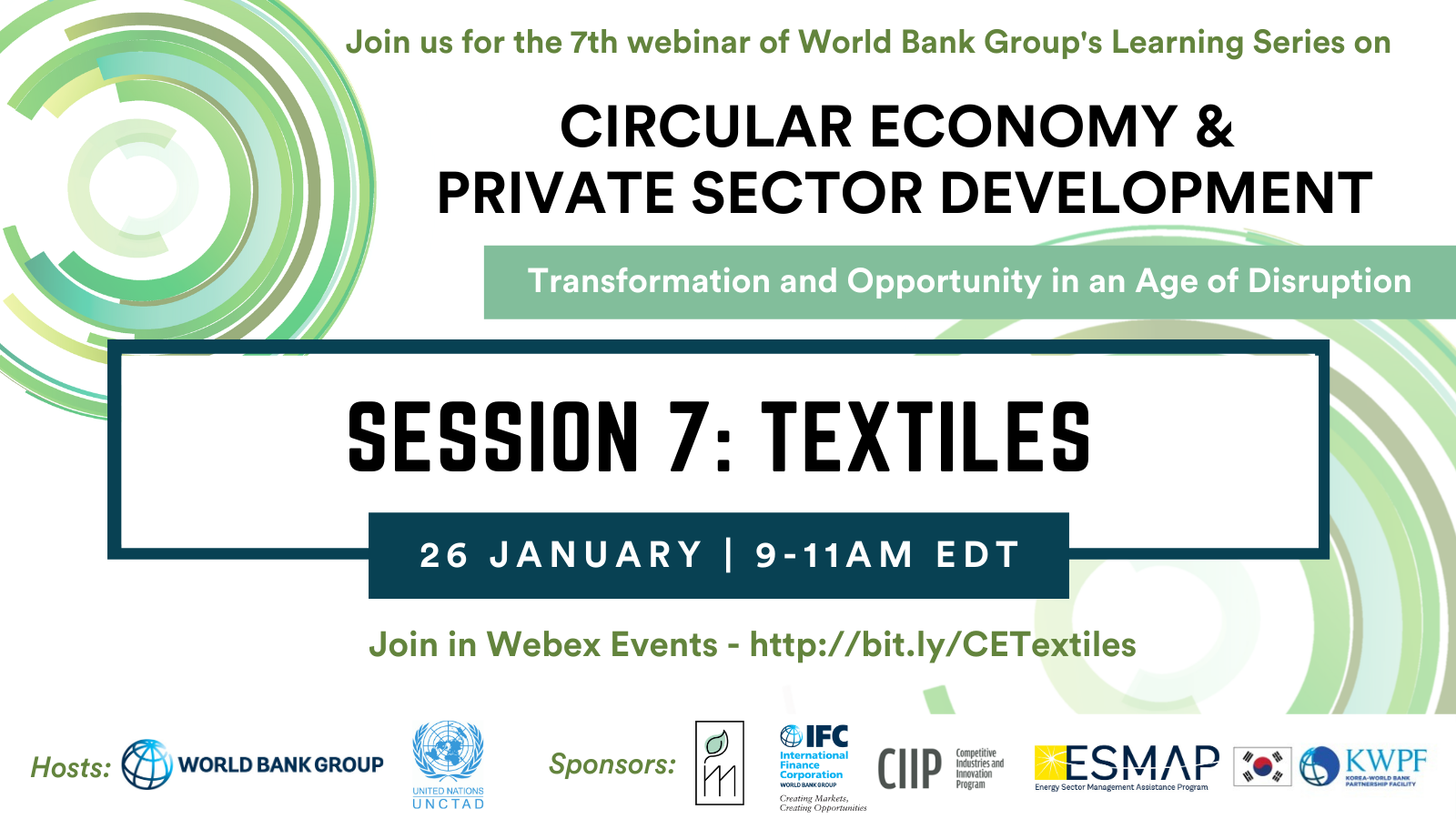
Webinar: Circular Economy and Private Sector Development – Textiles Understanding how the private sector can help accelerate the world’s transition toward a regenerative and circular economy.
Event details
This webinar is the 7th session in a series on ‘Circular Economy and Private Sector Development’ hosted by the World Bank aimed at global leaders who are advancing sustainable textiles initiatives. It explores questions of economic viability, policy, environmental impact and scalability in a new normal.
Textiles are essential products, with multiple consumers, technical and industrial usages. Textiles are also global products, having supply chains sourcing from vast agriculture and petrochemical sectors, with an upstream involving various steps of manufacturing distributed across the world. In 2019, the global market for textiles, including apparel, approached USD 1 trillion, with production concentrated in developing countries like China, India, Bangladesh, Pakistan, Brazil and Turkey. Textiles are made of a variety of natural and synthetic fibers, as well as various blends, whose lifecycles bring environmental and social consequences for producing and consuming countries. Those include CO2 emissions embedded in materials, health impacts from synthetic dyes and toxic metals used in production, as well as ocean plastics pollution (esp. linked to polyester and other plastic-based fibers). Substantial concerns have been also raised on the unregulated trade of 2nd hand clothes, which many countries – especially in East Africa – denounce as being detrimental to their national development efforts.
Textiles – including the apparel and fashion industries – are facing a transformation moment. With a general perception that linear, fast-fashion models are unsustainable, consumers, businesses, and regulators search ways to make textiles and apparel into a more efficient and less polluting sector. Circular solutions are seen as a way to transform the sector, from its material essence to its guiding business models. A variety of measures are proposed, including design-for-durability, materials innovation, mainstreaming and modernizing second-hand markets, as well as promoting different business models which rely on access-as-a-service instead of ownership for garments.
Find out more about the World Bank Learning Series
Agenda
SESSION 7: CIRCULAR ECONOMY AND TEXTILES
| 26 January 2021 | 9:00 – 11:00 am EDT | |
|
9:00 – 9:05 |
Housekeeping and Introduction to Session Opening remarks by UNCTAD Deputy Secretary General Isabelle Durant |
| 9:05 – 9:20 |
Framing the Transition towards a Circular Economy in Textiles Francois Souchet, Lead, Make Fashion Circular, Ellen MacArthur Foundation |
| 9:20 – 10:00 |
Re-designing the Value Chain: Production, Materials and Design Moderated by Lisa Emberson, SEI Affiliated Researcher and University of York
|
| 10:00 – 10:40 |
Optimizing Value: Business Models, Brand Leadership Moderated by Whitney Bauck, Senior Sustainability Reporter at Fashionista
|
| 10:40 – 11:00 |
Enabling the Ecosystem – Open Panel Discussion Moderated by Henrique Pacini, Economist, UNCTAD |
Prof Lisa Emberson
Professor Lisa Emberson is an environmental pollution biologist in the Department of Environment and Geography. She became the Centre Director of SEI York in December 2012 and was made Professor in October 2017. She left SEI in August 2019 to join the Dept of Environment and Geography.
In 2020, SEI and the Dept of Environment and Geography produced the report, Manufacturing Pollution in sub-Saharan Africa and South Asia: Implications for the Environment, Health and Future Work, which was commissioned by The United Nations Conference on Trade and Development (UNCTAD) and funded by the UK Foreign, Commonwealth and Development Office (FCDO) as part of the Sustainable Manufacturing and Environmental Pollution (SMEP) Programme.
Lisa was lead author of the report, which maps manufacturing pollution hotspots in sub-Saharan Africa and South Asia, identified that the textiles, apparel and tanneries sectors, which rely heavily on natural resources, are among the most polluting manufacturing industries in both regions.